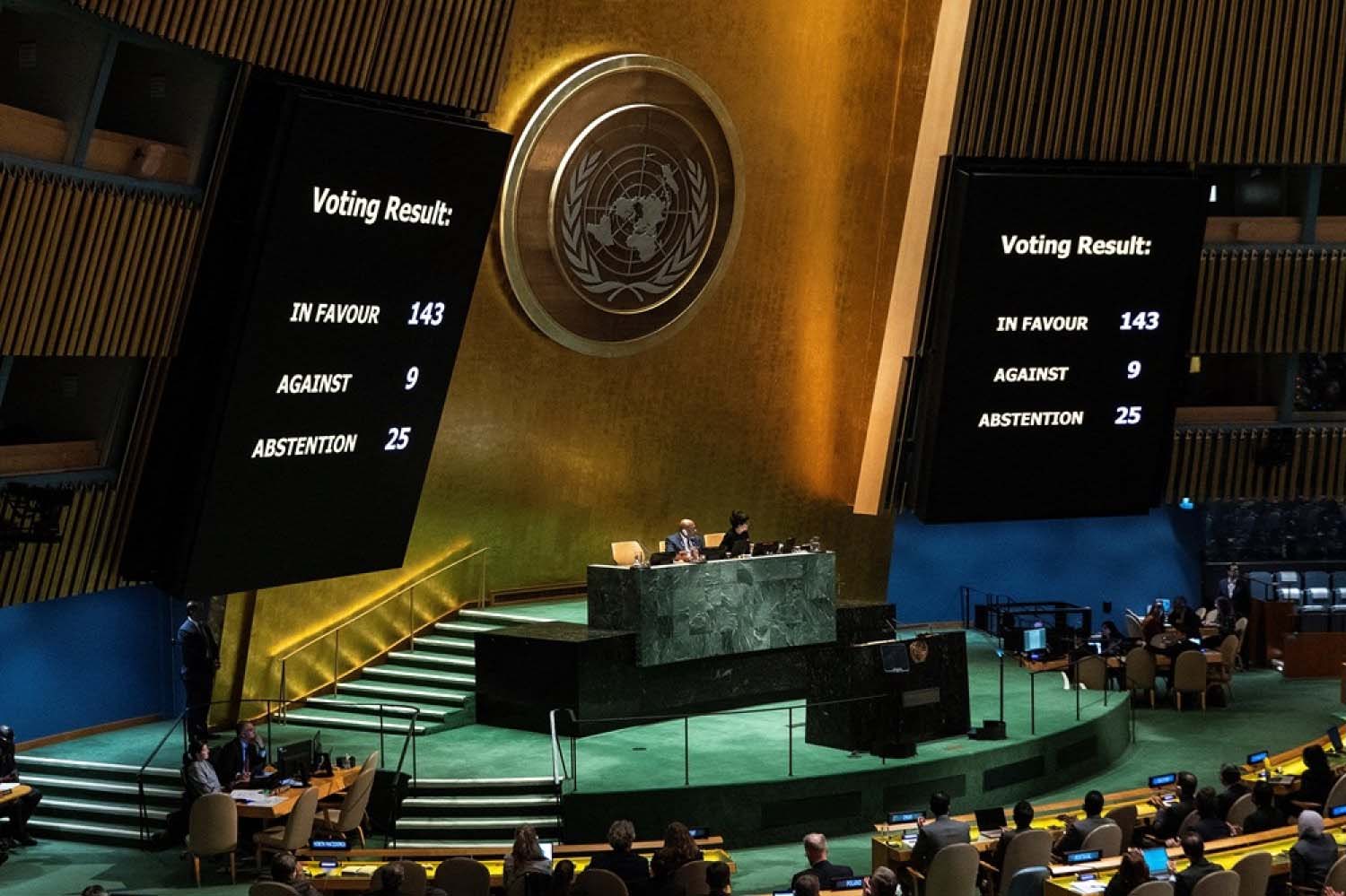The U.N. General Assembly voted by a wide margin on Friday to grant new “rights and privileges” to Palestine and called on the Security Council to reconsider Palestine’s request to become the 194th member of the United Nations.
The world body approved the Arab and Palestinian-sponsored resolution by a vote of 143-9 with 25 abstentions. The United States voted against it, along with Israel, Argentina, Czechia, Hungary, Micronesia, Nauru, Palau and Papua New Guinea.
It also demonstrated growing support for the Palestinians. A General Assembly resolution on October 27 calling for a humanitarian cease-fire in Gaza was approved 120-14 with 45 abstentions. That was just weeks after Israel launched its military offensive in response to Hamas’ Oct. 7 attack in southern Israel, which killed 1,200 people.
U.S. Deputy Ambassador Robert Wood said Friday that for the U.S. to support Palestinian statehood, direct negotiations must guarantee Israel’s security and future as a democratic Jewish state and that Palestinians can live in peace in a state of their own. The U.S. also vetoed a widely backed council resolution on April 18 that would have paved the way for full United Nations membership for Palestine. Under the U.N. Charter, prospective members of the United Nations must be “peace-loving” and the Security Council must recommend their admission to the General Assembly for final approval. Palestine became a U.N. non-member observer state in 2012.
The United States considers Friday’s resolution an attempt to get around the Charter’s provisions, Wood reiterated Thursday. Unlike resolutions in the Security Council, there are no vetoes in the 193-member General Assembly. Friday’s resolution required a two-thirds majority of members voting and got significantly more than the 118-vote minimum. U.S. allies supported the resolution, including France, Japan, South Korea, Spain, Australia, Estonia and Norway. But European countries were very divided.
The resolution “determines” that the state of Palestine is qualified for membership — dropping the original language that in the General Assembly’s judgment it is “a peace-loving state.” It, therefore, recommends that the Security Council reconsider its request “favourably.” The renewed push for full Palestinian membership in the U.N. comes as the war in Gaza has put the more than 75-year-old Israeli-Palestinian conflict at center stage.
At numerous council and assembly meetings, the humanitarian crisis facing the Palestinians in Gaza and the killing of more than 34,000 people in the territory, according to Gaza health officials, have generated outrage from many countries.
Before the vote, Riyad Mansour, the Palestinian U.N. ambassador, told the assembly in an emotional speech that “No words can capture what such loss and trauma signifies for Palestinians, their families, communities and for our nation as a whole.”
He said Palestinians in Gaza “have been pushed to the very edge of the strip, to the very brink of life” with Israel besieging Rafah. Mansour accused Israel’s Prime Minister Benjamin Netanyahu of preparing “to kill thousands to ensure his political survival” and aiming to destroy the Palestinian people.
He welcomed the resolution’s strong support and told AP that 144 countries have now recognized the state of Palestine, including four countries since October 7, all from the Caribbean. Israel’s U.N. Ambassador Gilad Erdan vehemently opposed the resolution, accusing U.N. member nations of not mentioning Hamas’ October 7 attack and seeking “to reward modern-day Nazis with rights and privileges.”
He said if an election were held today, Hamas would win and warned U.N. members that they were “about to grant privileges and rights to the future terror state of Hamas.” He held up a photo of Yehya Sinwar, the mastermind of the Hamas attack on Israel, saying a terrorist “whose stated goal is Jewish genocide” would be a future Palestinian leader.









